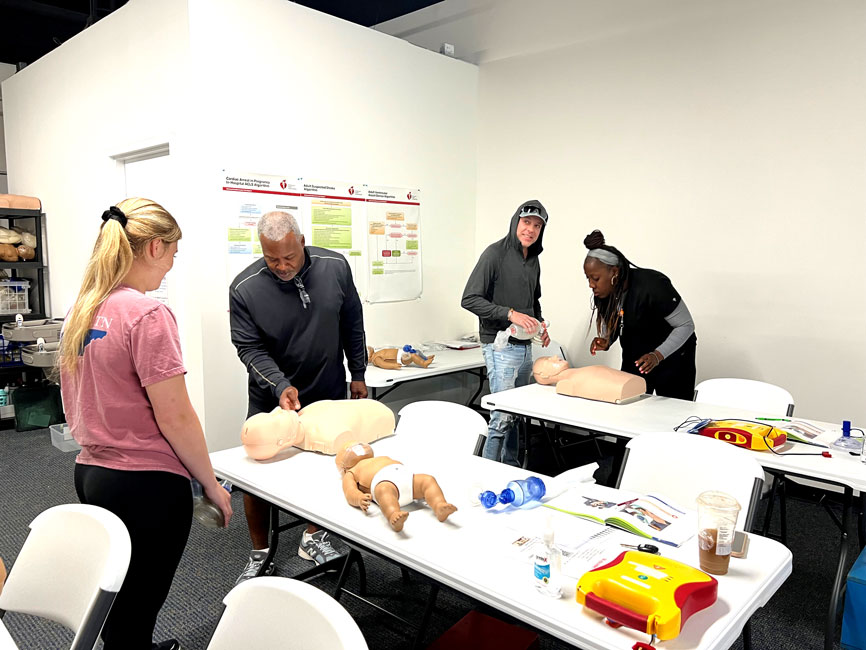Basic Life Support (BLS) serves as a critical medical intervention in emergencies, providing essential care to individuals experiencing life-threatening conditions. Understanding the purpose of BLS is paramount for anyone who might find themselves in a position to assist during an emergency. By maintaining vital functions and preventing further complications until professional medical help arrives, BLS can significantly improve outcomes for patients in distress. This article will delve into the definition, importance, and practical applications of BLS, underscoring its role in saving lives and maintaining health during critical moments.
What is Basic Life Support (BLS)?
BLS is defined as a set of life-saving protocols designed to maintain oxygenated blood flow to vital organs in individuals experiencing cardiac arrest, respiratory failure, or other critical conditions. Typically administered by healthcare professionals, first responders, or trained bystanders, BLS encompasses several key components, including cardiopulmonary resuscitation (CPR), airway management, and defibrillation. One of the primary advantages of BLS is its non-invasive nature, focusing on the preservation of life and the maintenance of circulation and breathing without requiring advanced medical equipment or invasive techniques.
The Primary Purpose of Basic Life Support
The primary purpose of Basic Life Support is to preserve life by preventing death through the maintenance of circulation and breathing during emergencies. When a person experiences cardiac arrest, their heart ceases to pump blood effectively, leading to a rapid decline in vital organ function. BLS acts as a crucial lifeline, ensuring that oxygenated blood continues to circulate to the brain and other essential organs. Additionally, BLS plays a vital role in preventing further injury by stabilizing patients and minimizing complications that may arise from the lack of oxygen. By promoting recovery, BLS ensures that vital organs receive the necessary oxygen to prevent irreversible damage, particularly to the brain. Furthermore, BLS serves as a bridge to advanced medical care, providing critical interventions before more sophisticated techniques are available, effectively buying time for emergency responders to arrive.
Key Scenarios Where BLS is Needed
BLS is needed in several key scenarios, each of which highlights the importance of immediate intervention. In cases of cardiac arrest, the immediate response of trained bystanders to perform CPR can be the difference between life and death. Similarly, choking or airway obstruction requires prompt action to clear the airways and restore breathing. In drowning incidents, BLS techniques are employed to restore breathing and circulation, critical to the victim’s survival. Severe trauma from accidents can also necessitate BLS to offer immediate care until professional help is available. Other medical emergencies, such as overdose or respiratory failure, also highlight the need for BLS intervention to stabilize the victim.
Components of BLS: Step-by-Step Process
The components of BLS follow a step-by-step process that is vital to effective implementation during emergencies.
- First and foremost, scene safety must be ensured, meaning that responders must assess their environment to guarantee it is safe for both themselves and the victim.
- Next, checking for responsiveness is essential; responders must assess the victim’s consciousness and breathing to determine the appropriate next steps.
- Activating the emergency response system is critical—this includes calling for help or ensuring that 911 or local emergency services have been contacted.
- Following this, chest compressions form a cornerstone of effective CPR, requiring the responder to perform compressions with the right technique and rhythm to maintain blood flow.
- Airway management is also vital, as responders must ensure a clear airway and provide rescue breaths if necessary.
- Finally, if an Automated External Defibrillator (AED) is available, its use can significantly improve the chances of survival for a cardiac arrest victim.
The Importance of BLS Training
The importance of BLS training cannot be overstated. This training is accessible to both laypersons and professionals, making it feasible for anyone to become equipped to handle emergencies. Widespread BLS training has been shown to reduce mortality rates significantly in emergencies, as more people become capable of providing immediate care. Legal protections, such as Good Samaritan laws, further encourage individuals to administer BLS by protecting them from legal repercussions when providing care in good faith. Regular retraining is essential to keep skills fresh and to stay updated on new techniques, ensuring that individuals are prepared to respond effectively in emergencies.
Conclusion
In conclusion, Basic Life Support (BLS) serves as a crucial lifeline in emergencies, bridging the critical gap between the onset of a life-threatening event and the arrival of professional medical help. Its purpose extends far beyond mere first aid—it’s about preserving life, preventing further injury, and promoting recovery. By mastering BLS skills, individuals become empowered to make a real difference in dire circumstances, potentially saving lives in their communities, workplaces, and homes.
Given the vital importance of these skills, we urge you to take action today. Enroll in a CPR certification course in Nashville to gain the knowledge and confidence needed to respond effectively in emergencies. CPR Nashville, an American Heart Association training site, offers top-notch CPR certification in Nashville programs. Their stress-free, hands-on classes ensure you’ll receive the best CPR training in Nashville.
Whether you’re a healthcare professional seeking BLS certification in Nashville or a concerned citizen wanting to be prepared, CPR Nashville has you covered. They offer initial certifications and renewals in BLS, ACLS, PALS, and CPR and First Aid courses. Don’t wait for an emergency to wish you had these skills—act now and become a potential lifesaver in your community.






